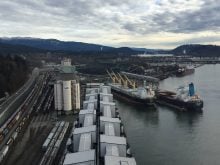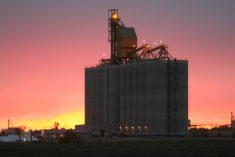The Manitoba Pipeline Landowners Association is attempting to organize landowners along the route to be taken by two of Enbridge Inc.’s proposed pipeline projects that will transport Alberta oil sands product to refineries in the United States.
“We’re coming up with a game plan. We’ll proceed from there,” said Brian Andrew, president of the MPLA.
The longest line of the two, Alberta Clipper, is to seek National Energy Board approval in March.
It will see 1,609 kilometres of one metre diameter pipe buried a metre deep mainly on or alongside an existing right-of-way that stretches from Hardisty, Alta., through southern Saskatchewan and the southwestern corner of Manitoba to Superior, Wisconsin.
Read Also

Malting barley exporters target Mexican market
Canada’s barley sector is setting its sights on the Mexican market to help mop up some of the lost demand from China
Enbridge will seek approval in January for the Canadian leg of its proposed Southern Lights expansion, which will run from Cromer to Gretna, Man.
Construction is scheduled to begin in 2008, with both new pipelines to be in service by late 2009.
The MPLA, which was formed in the late 1990s ahead of an earlier pipeline expansion in 1999, hopes to create a unified group to address past issues and negotiate a new settlement with the pipeline giant.
The group, which has signed up more than 100 landowners so far, held six meetings in recent months. Members pay a $50 fee to join the group, and are asked to sign an agreement committing them to support a legal defence fund.
“When we figure out what we need to proceed, then we will ask them to contribute on a pro rata basis,” Andrew said, adding that all spending must be approved by the members.
He said the existing right-of-way, which is 20 metres wide, is full in many places with five pipes already in the ground, some of which were installed in the 1950s. To put the two new pipes in, Enbridge may seek an additional 20 metre concession from some landowners, he said.
“This expansion may create some interesting problems when they go to expand the right-of-way,” said Andrew. “The right-of-way does go fairly close to quite a few yards already.”
The MPLA wants landowners to consider its proposals before signing agreements with Enbridge representatives, who have been visiting landowners along the pipeline.
“We are asking them to wait,” said Andrew.
Dave Core, a longtime landowners’ rights activist who used to run a turkey farm with a pipeline running through it near Sarnia, Ont., is the founding president of the Canadian Alliance of Pipeline Landowners Associations, or CAPLA.
The organization represents nine regional groups across the country, he said.
Core said most people aren’t aware of the lasting implications of signing with pipeline companies. Key issues for landowners include the future possibility of pipeline abandonment, liability, safety and compensation.
CAPLA is pushing for the establishment of an abandonment fund that would pay for digging up old pipelines and cleaning up sites.
“Abandonment has to be addressed. Our farms will become like an old gas station. If you look across the West, there are lots of gas stations that are abandoned because nobody wants to clean them up,” he said. “The time is coming. Some of these pipes are over 50 years old now.”
By forming associations, landowners would benefit from strength in numbers and be able to negotiate better deals than they would on their own, he said.














